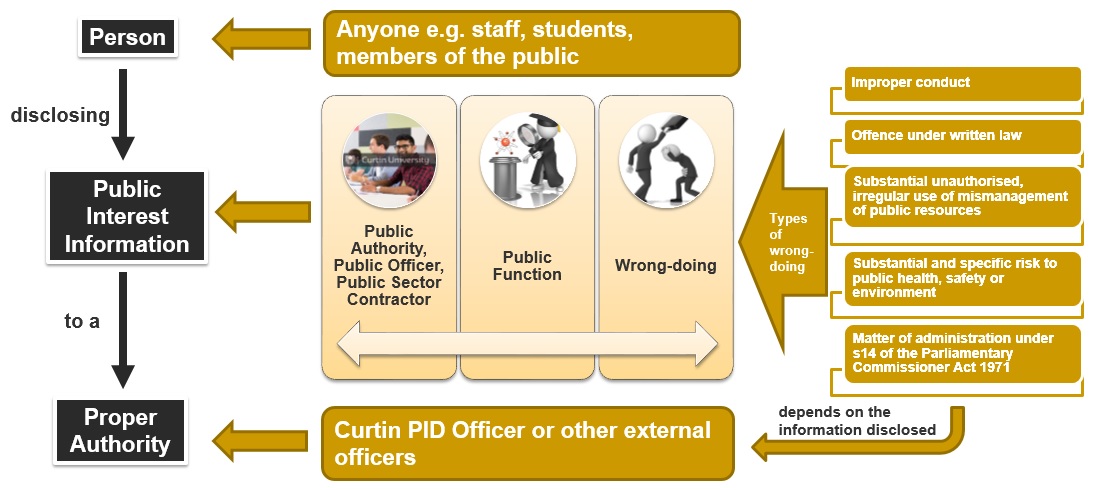Public interest disclosures
What is a public interest disclosure?
The Public Interest Disclosure (PID) Act 2003 (the Act) encourages you to come forward with information about wrong-doing without your identity being revealed or fear of reprisal. The Act also provides a system for the matters disclosed to be investigated and for appropriate action to be taken.
NOTE: A quick summary of the whole process is found in the following document:
PID Act Statement to Stakeholders
What is meant by "wrong-doing"?
Under the Act, wrong-doing means any of the following:
- Improper conduct e.g. corruption, bribery, fraud, theft.
- Offences under written law.
- Substantial misuse or mismanagement of public resources.
- Substantial risk to public health, safety or the environment.
- Matters of administration that can be investigated under s14 of the Parliamentary Commissioner Act 1971 (i.e. administration matters that affect a person in their personal capacity at Curtin that fall within the jurisdiction of the Ombudsman).
Wrong-doing by who?
A disclosure of wrong-doing must be in regard to public interest information i.e. information that shows or tends to show wrongdoing by a public authority, public officer or public sector contractor when performing a public function.
This means a disclosure, to be covered under the Act, must be more than just a general complaint about dissatisfaction with a product or service, or a grievance that can be resolved by agreement between parties.
Who can make a disclosure?
Anyone, and a disclosure can be made anonymously. However, the discloser must believe the information is, or may be true; and the discloser must make the disclosure consciously and voluntarily under the Act.
Not sure where to go?
The PID officer (see below) can provide you with detailed guidelines about how to make a public interest disclosure and the processes that are followed once a disclosure is made. Confidential enquiries may also be made via a restricted access mail box pid@curtin.edu.au
In addition, more information may be obtained by visiting the Public Sector Commission website or by calling the WA Public Sector Commission's PID Advice and Referral Line on 1800 676 607.
To obtain a more detailed understanding of what is involved in making a protected disclosure, the Public Sector Commission has a video titled Speaking out - A Guide to Making a Public Interest Disclosurewhich is well worth a look.
To whom should I make a disclosure?
To be covered under the PID Act and for the protections of the PID Act to apply, a PID must be made to a proper authority. For matters that are within the sphere of responsibility of Curtin as a public authority, the proper authority is the Curtin University PID Officer. For other matters, a disclosure will need to be made to an external party, such as the Auditor General, Police, Corruption and Crime Commission or Ombudsman.
The person from time to time holding or acting in the position of Director Integrity and Standards Unit (ISU) is designated as the primary Public Interest Disclosure Officer (the PID Officer) of Curtin University. The contact details of the PID Officer are as follows:
Steven Tamigi
Director - Risk, Compliance & Audit
Email: steven.tamigi@curtin.edu.au
Phone: (08) 9266 7400
The University also has a backup PID officer:
Karen Olkowski, Complaint Management Consultant
Email: karen.olkowski@curtin.edu.au
Phone: (08) 9266 9184
NOTE: you are encouraged to initially contact a PID officer to confidentially discuss your matters of concern, prior to making a formal disclosure.
How does it all fit together?

